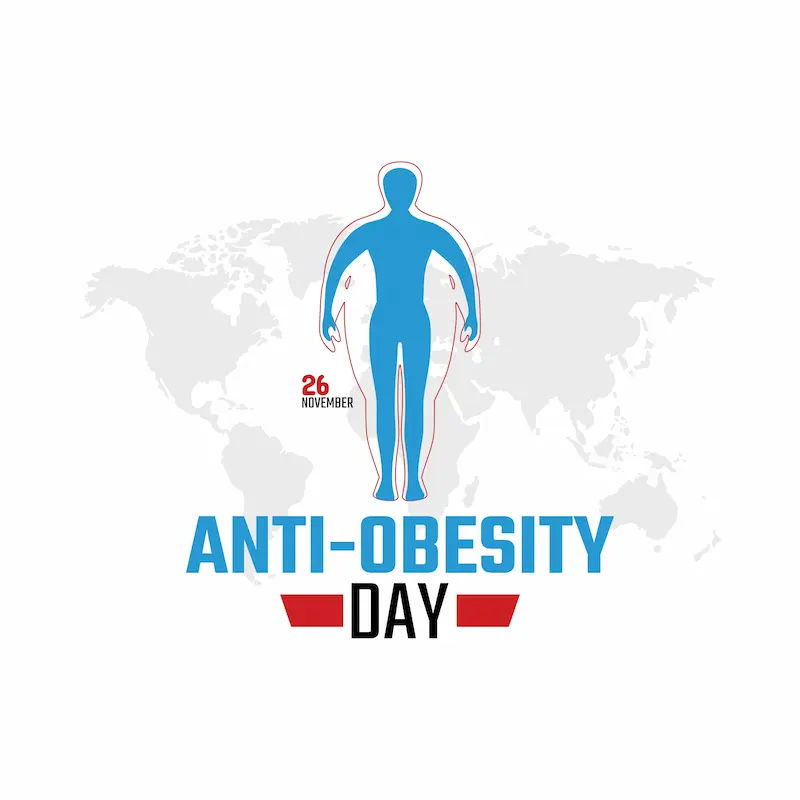Guide to World Obesity Day: Awareness and Action
Your complete guide to World Obesity Day: discover its purpose, history, health impacts of obesity, and how you can take action for better health.

Written by Dr. Rohinipriyanka Pondugula
Reviewed by Dr. Shaik Abdul Kalam MD (Physician)
Last updated on 13th Jan, 2026

Introduction
Every year, World Obesity Day serves as a crucial global platform to raise awareness, improve policies, and share knowledge about a health crisis affecting over a billion people. Observed on March 4th, this day is not about promoting fad diets or assigning blame; it's about fostering a deeper, more compassionate understanding of obesity as a complex chronic disease. With rates rising dramatically in both adults and children, the need for a unified response has never been greater. This guide will walk you through the significance of World Obesity Day, unpack the latest theme, explore the multifaceted causes of obesity, and provide actionable steps you can take for your health and your community. Let's move beyond the scale and start a meaningful conversation.
What is World Obesity Day?
World Obesity Day is an annual campaign established to stimulate and support practical actions that will help people achieve and maintain a healthy weight, and reverse the global obesity crisis. It is a unified day of action that was officially formed in 2015 by the World Obesity Federation, a partner of the World Health Organisation (WHO).
The History and Mission Behind the Day
The day was created to address the glaring gap in awareness and policy regarding obesity. Despite its status as a leading risk factor for numerous non-communicable diseases, obesity has often been overlooked in public health agendas. The mission of World Obesity Day is to lead and drive global efforts to reduce, prevent, and treat obesity. It aims to change narratives, transform health systems, and break cycles of shame and blame that surround the condition.
Why a Dedicated Day for Obesity Matters
A dedicated day cuts through the noise. It provides a focal point for governments, health organisations, media, and individuals to align their efforts. This concentrated awareness can lead to increased media coverage, policy discussions, and public engagement, creating a ripple effect that lasts long after the day itself. It reminds us that obesity is a global issue requiring a coordinated, multi-stakeholder response.
Consult a Bariatrician for the best advice
The Theme for World Obesity Day 2024: 'Let's Talk About Obesity &...'
The theme for World Obesity Day 2024 is “Let’s Talk About Obesity &…”. This theme is a powerful call to action to broaden the conversation beyond simplistic solutions. It encourages people to connect obesity to a wider range of topics that are often discussed in isolation, such as mental health, youth, and our world.
Breaking the Stigma: The Power of Conversation
Stigma is one of the biggest barriers to addressing obesity effectively. The 2024 theme directly tackles this by encouraging open, non-judgmental dialogue. By talking about obesity and mental health, we can address the cycle of depression and weight gain. By discussing obesity and youth, we can focus on prevention and building healthy habits from a young age. This approach helps to normalise the conversation and reduce the shame that prevents many from seeking help.
Key Goals of the 2024 Campaign
The campaign aims to:
Cross-Link Discussions: Connect obesity to other health and societal challenges.
Share Knowledge: Amplify the voices of those with lived experience and healthcare professionals.
Push for Policy Change: Advocate for policies that address the root causes, like regulating the marketing of unhealthy foods to children.
Understanding Obesity: It's More Than Just Weight
Many people mistakenly believe obesity is solely a result of poor willpower. In reality, it is a complex, multifactorial disease influenced by genetics, physiology, environment, and psychology.
Defining Obesity: BMI and Beyond
While body mass index (BMI)—a measure of weight relative to height—is commonly used as a screening tool (with a BMI of 30 or above indicating obesity), it has limitations. It doesn’t distinguish between muscle and fat. A more comprehensive understanding of obesity involves looking at waist circumference, body composition, and, most importantly, the presence of any obesity-related health conditions like high blood pressure or sleep apnoea.
The Complex Causes of Obesity
The simplistic "calories in, calories out" model is outdated. The causes are deeply intertwined.
Genetic and Hormonal Factors: Science shows that genetics can predispose individuals to obesity. Hormones like leptin and ghrelin, which regulate hunger and satiety, can function differently in some people, making it biologically harder to lose weight and keep it off.
Environmental and Societal Drivers (The Obesogenic Environment): We live in an environment that promotes weight gain. This includes the widespread availability of high-calorie, low-nutrient processed foods, aggressive marketing of unhealthy products, sedentary jobs, and a lack of safe spaces for physical activity. These factors make healthy choices the more difficult choices.
Obesity as a Chronic Disease, Not a Choice
Recognising obesity as a chronic disease is a critical paradigm shift. We don't blame people for having asthma or hypertension; we treat them. Similarly, obesity management requires long-term, compassionate medical support and treatment strategies, not just shaming and short-term dieting.
The Global Impact: Shocking Obesity Statistics
The numbers paint a startling picture of a worldwide epidemic.
According to the World Obesity Atlas 2023, it is projected that 51% of the world's population will be living with either overweight or obesity by 2035 if current trends continue.
Childhood obesity is rising at an alarming rate, with predictions suggesting a 100% increase in rates among boys and a 125% increase among girls by 2035 compared to 2020 levels.
The economic impact is colossal. The global economic impact of overweight and obesity is predicted to reach $4.32 trillion annually by 2035, nearly 3% of global GDP, due to healthcare costs and lost productivity.
The Health Risks Associated with Obesity
Obesity is a major gateway to numerous serious health conditions, affecting nearly every system in the body.
Physical Health Conditions
Carrying excess weight significantly increases the risk of developing:
Cardiovascular disease: Including heart attacks and stroke.
Type 2 Diabetes: Closely linked to obesity.
Certain Cancers: Such as breast, colon, endometrial, and kidney cancer.
Sleep Apnoea: A serious disorder where breathing repeatedly stops and starts.
Osteoarthritis: Due to increased stress on joints.
Mental and Emotional Health Impacts
The psychological toll is profound. People with obesity often face weight stigma and discrimination, which can lead to:
Depression and Anxiety: The cycle of weight stigma and mental health issues is well-documented.
Low Self-Esteem: Often fueled by societal pressure and unrealistic body standards.
Social Isolation: Due to fear of judgment or inability to participate in certain activities.
If you are struggling with your weight and noticing impacts on your mental or physical health, it's important to seek professional guidance. Consult a doctor online with Apollo24|7 for a confidential and compassionate evaluation to discuss your concerns and create a sustainable management plan.
How to Take Action: For Ourselves and Our Communities
Change happens at both the individual and societal levels.
Individual Steps for Sustainable Weight Management
Focus on health, not just weight.
Prioritise Whole Foods: Build your meals around fruits, vegetables, lean proteins, and whole grains.
Find Joy in Movement: Engage in physical activities you enjoy, whether it's dancing, swimming, or walking.
Prioritise Sleep: Poor sleep disrupts hunger hormones.
Manage Stress: Chronic stress can lead to emotional eating.
Seek Support: Talk to a healthcare professional. Apollo24|7 offers a convenient home collection for tests like HbA1c (for diabetes risk) and lipid profiles, making it easier to monitor your metabolic health from home.
Advocating for Healthier Societies
Individual action is not enough. We must advocate for changes that make healthy choices easier for everyone:
Support policies that improve the nutritional quality of school meals.
Advocate for urban planning that includes parks, sidewalks, and bike lanes.
Encourage workplaces to promote wellness initiatives.
Challenge weight stigma when you see it and promote body inclusivity.
Conclusion
World Obesity Day is more than a date on the calendar; it's a catalyst for a fundamental shift in how we perceive and address one of the most pressing health challenges of our time. By understanding that obesity is a complex disease rooted in biology and shaped by our environment, we can replace stigma with support and blame with empathy. This day reminds us that the solution lies not in quick fixes, but in sustained, collective action—from making informed choices for our own health to advocating for a world where healthy living is accessible to all. Let's use the momentum of World Obesity Day to start conversations, support each other, and build a healthier, more inclusive future. Your journey matters. Take the first step today by educating yourself and reaching out for support if you need it.
Consult a Bariatrician for the best advice
Consult a Bariatrician for the best advice

Dr. Sunil Kaul
General Surgeon
30 Years • MBBS, MS, FICS, FIMSA, FMAS
Delhi
Apollo Hospitals Indraprastha, Delhi
(25+ Patients)

Dr. Saket Goel
General Surgeon
27 Years • MBBS, MS (Surg.)
Delhi
Apollo Hospitals Indraprastha, Delhi
(125+ Patients)

Dr. Aparna Bhasker
Bariatrician
18 Years • MBBS MS
Mumbai
Apollo Hospitals CBD Belapur, Mumbai

Dr. Nikhilesh Krishna
Bariatrician
7 Years • MS, FMAS, FALBS
Chennai
Apollo Hospitals Greams Road, Chennai

Dr. Praveen Sodhi
General Surgeon
20 Years • MBBS, MS Lap., Gastro, Anorectal & Breast Surg.
Delhi
Apollo Hospitals Indraprastha, Delhi
(175+ Patients)
More articles from Obesity
Frequently Asked Questions
1. What is the main goal of World Obesity Day?
The main goal is to promote practical solutions to end the global obesity crisis, raise awareness of its root causes, and challenge the stigma and misunderstanding that surrounds the disease.
2. How can I participate in World Obesity Day?
You can participate by educating yourself and others, sharing evidence-based information on social media using the official hashtag (e.g., #WorldObesityDay), attending or organising local events, and advocating for healthier public policies in your community.
3. What is the difference between being overweight and obesity?
Both are defined by body mass index (BMI). 'Overweight' is a BMI of 25 to 29.9, while 'Obesity' is a BMI of 30 or higher. However, BMI is just a screening tool; a healthcare provider can give a more comprehensive health assessment.
4. What are the first steps to managing obesity?
The first and most important step is to consult a healthcare professional. They can help rule out underlying medical causes, provide a structured and personalised plan for sustainable weight management, and connect you with specialists like dietitians or endocrinologists if needed.
5. How can I talk to a loved one about their weight without causing offense?
Focus on health and support, not weight or appearance. Use 'I' statements expressing concern for their wellbeing ('I care about your health and want you to feel your best'). Most importantly, listen without judgment and offer to help them find resources or accompany them to a doctor's appointment.

_1.webp)


